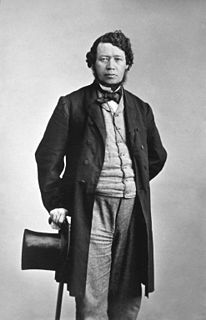A Quote by C. Wright Mills
Whatever sociology may be, it is the result of constantly asking the question, what is the meaning of this?
Quote Topics
Related Quotes
What is there to understand? The significance of life? How long will it take to understand the significance and the meaning of life? 20 years? 30 years? And the same question will be here in another 20 years, I guarantee you. Until you stop asking that question. When that question is not there, you are there. So that's the reason why you keep asking the question: you do not want the question to come to an end. When that comes to an end, there will not be anybody, left there, to find out the meaning, the purpose and the significance of life.
I started my professional life as a philosopher of language and for several years took the orthodox line that meaning is an essentially linguistic phenomenon. Whether as a result of simply listening to everyday talk about meaning, or reading books of anthropology, sociology and art history, it dawned on me that there is nothing at all privileged or central about linguistic meaning.
Opportunism towards knowledge is a utilitarian demand that knowledge must be immediately practical. Just like with sociology where we hope its purpose is to serve society, however, the true purpose of sociology lies in its impracticality. It cannot become practical or else it loses its meaning. Perhaps we should learn a different kind of knowledge: the knowledge to question knowledge.
Whatever man may stand, whatever he may do, to whatever he may apply his hand - in agriculture, in commerce, and in industry, or his mind, in the world of art, and science - he is, in whatsoever it may be, constantly standing before the face of God. He is employed in the service of his God. He has strictly to obey his God. And above all, he has to aim at the glory of his God.
It's the most annoying question and they just can't help asking you. You'll be asked it at family gatherings, weddings, and on first dates. And you'll ask yourself far too often. It's the question that has no good answer. It's the question that when people stop asking it, you'll feel even worse. - WHY ARE YOU SINGLE?
It's also hard for people to contend with the difficult possibility that we are simply overadvanced fungi and bacteria hurtling through a galaxy in cold, meaningless space. But just because our existence may have arisen unintentionally and without purpose doesn't preclude meaning or purpose from emerging as a result of our interaction and collaboration. Meaning may not be a precondition for humanity as much as a by-product of it.
Everything we did was done in form and with propriety, and the result of our proceedings is the document [the Quebec Resolutions] that has been submitted to the imperial government as well as to this house and which we speak of here as a treaty. And that there may be no doubt about our position in regard to that document we say, question it you may, reject it you may, or accept it you may, but alter it you may not.
Researchers have been asking a basic question of young people. Should men be allowed to beat their wives? How you answer that question may depend on where you live. U.N. researchers put that question to adolescent girls in India and Pakistan and 53 percent - a majority of girls - said yes, wife beating is justifiable even if it's for refusing sex.






































